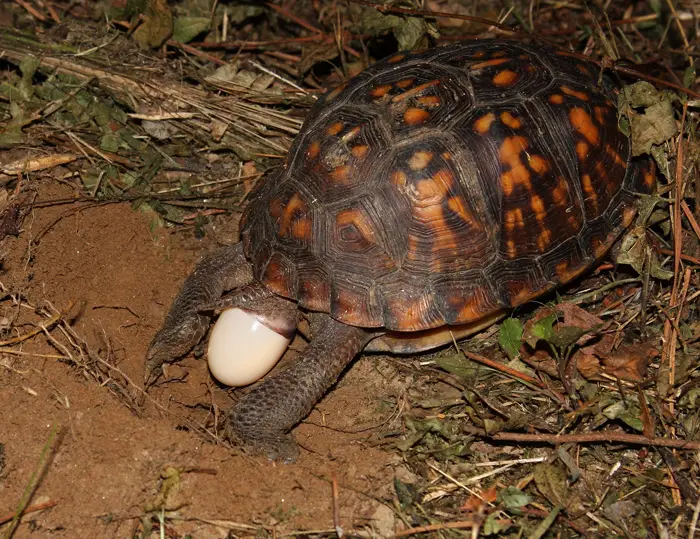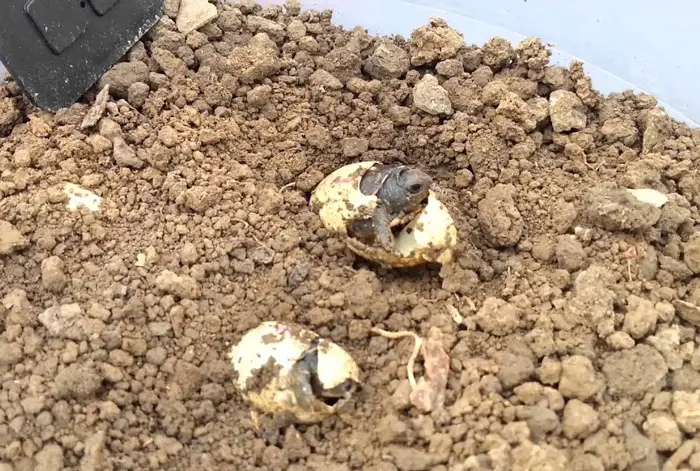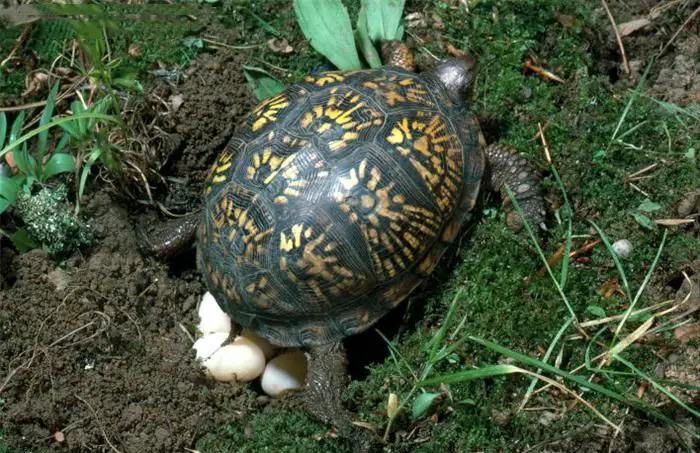Box Turtle Eggs Care Guide: Things To Do And Not To Do
If you own a female box turtle, then you know that she will lay eggs at some point. But how do you take care of her eggs to increase their survival chances? This guide will answer all your questions regarding box turtle eggs care.
Box turtle eggs care guide: To take care of your box turtle eggs, you want to transfer them to a suitable nesting area and incubate them at consistent temperature and humidity levels. Regularly monitor the eggs and avoid moving them as much as possible throughout the incubation period.
This article discusses the Dos and Don’ts for taking care of your box turtle eggs. We’ll share tips on how to incubate the eggs properly, keep them safe and healthy, and more.
Box Turtle Eggs Care Guide: Things To Do And Not To Do
Contents
Below, we have shared things to do to ensure your turtle eggs stay safe and healthy.

Things to do:
Locate the turtle eggs: Find the location where the turtle laid the eggs and mark it with a small stick/flag. This step is crucial to help you keep track of them and ensure you don’t accidentally disturb them.
Avoid removing her eggs from the wild: If your turtle has decided to lay her eggs in nature, we advise you to let them hatch there naturally. The only time you should consider moving them is if you believe they are in danger. In this case, you can move them to a nesting box or incubator.
Transfer the eggs to a separate nesting area: If the turtle laid the eggs in her enclosure where you don’t think they’re safe, we advise you to move them to a separate nesting area. You can make a DIY incubator using a plastic container, half filled with moist peat moss (vermiculite can also work). Maintain the container temperature at around 80 to 85 degrees F and humidity at 80%. A heat source and thermometer will help you keep the temperature consistent.
Use an artificial incubator: If you don’t want to put the eggs in the DIY nesting area above, a good alternative would be a reptile egg incubator.
Moving the eggs: Carefully transfer the eggs to the incubator. The box turtle eggs are quite sensitive, so you don’t want to rotate or shake them during the transfer process.
Keep a close eye on the eggs: Monitor the eggs throughout the incubation process. Ensure they don’t get too dry or too wet. If your homemade nesting area becomes dry, you can mist it using water. Don’t move the eggs during this period or they may not hatch. Keep the handling to a minimum.

Be patient: The time it takes for box turtle eggs to hatch is around 70 to 90 days. During this period, we advise you to remain patient. Don’t be tempted to keep disturbing the eggs. Just let the eggs take their natural cause and hatch when it’s time to.
Let the baby turtles stay in the incubator: After 2-3 months, the eggs will eventually hatch into baby turtles. However, we don’t advise you to get them out of their nesting area or incubator immediately.
If you look closely, they may still be attached to a yolk sac, which nourishes them. As such, it’s important to let them stay in the incubator for about 1-2 days (or when the yolk sac disappears).
When the baby turtles are ready to get out of the incubator, place them in a terrarium with dry land and a water dish, just like their adult counterparts.
Things not to do:
Here are things you should avoid doping to increase the chances of your box turtle eggs hatching successfully:

Avoid moving the eggs too much: As we mentioned above, box turtle eggs are quite delicate. Avoid moving them as much as possible—only do it when it’s necessary.
Proper temperature is critical for the eggs’ health: You should regularly monitor your incubator or nesting area to ensure the temperatures remain steady (80 to 85 degrees F). This is crucial for the development of the embryos. If you let the temperature get too low or too high, the eggs may not hatch. Or the resulting baby turtles will be deformed.
Avoid misting your eggs directly: Proper humidity levels are also critical for the safety and health of the eggs. But you should only put the eggs in a box with moist substrate. Don’t mist them directly because they may become too wet, leading to the growth of mold and bacteria.
Let the eggs hatch on their own: Patience is key when it comes to taking care of your turtle eggs. Never rush the process. Let the baby turtles emerge on their own. Do not attempt to help them break from their shells as you may injure them and even kill them.
Never attempt to hatch wild box turtle eggs: The baby turtles that will hatch from these eggs have better survival chances in the wild if they remain undisturbed.
How to tell if box turtle eggs are fertile?
You can tell if your box turtle eggs are fertile by candling. This usually involves holding the eggs against bright light.
The idea is to illuminate the eggs and reveal any developing embryos.
For the best results, we advise you to do this in a dark room so you can clearly see the egg’s contents.
Use a bright light (candle or flashlight). Hold the egg up to this light and check the contents illuminate.
If the eggs are fertile, then you should be able to see veins as well as other signs of embryo development.
Here’s a video explaining how to check if turtle eggs are fertile:
Video
What month do box turtle eggs hatch?
Adult males usually have a strong urge to find a mate immediately after they come out of hibernation.
The hibernation period for turtles usually ends around March or early April.

This means if the eggs survive and take 2-3 months to hatch, you’ll see baby turtles in late summer.
However, the exact time they come out of hibernation may depend on geographical location as well as the weather.
Do box turtles lay all their eggs at once?
Box turtles usually all their eggs at once. These turtle species have one clutch every year. Each clutch consists of 2-5 eggs, though in some rare cases, the eggs may be as many as 10 to 11.

FAQs:
Here are some signs that your box turtle is about to lay eggs:
- Increased digging behavior; indicates preparation of the nesting site
- Digging a bigger hole than it typically digs
- Loss of appetite
- Your turtle appears restless
- The abdomen may appear larger as it’s filled with eggs
The box turtle can take anywhere from 2 to 3 months (or 70 to 90 days) to hatch after they are laid.
Conclusion
Taking proper care of your box turtle eggs is key to ensuring they stay safe and healthy. This increases their chances of successfully hatching into baby turtles. Key tips to keep in mind include maintaining steady temperature and humidity levels, keeping handling to a minimum, monitoring the eggs regularly during the incubation period, and being patient with your pet turtle as the incubation takes 2-3 months to hatch. By following these tips, you’ll maximize your box turtle eggs’ survival chances. Moreover, you’ll enjoy watching them hatch into adorable baby turtles.


A box turtle laid eggs in my front yard by the road. I spoke with DNR and they said they should hatch around day 60, which was yesterday. They told me if I am around when they hatch to carefully take the babies down near the creek in my back woods. Is this good advice? Do they hatch at night like sea turtles? An article I found said to keep them and feed them till they are bigger. Thank you
Carol